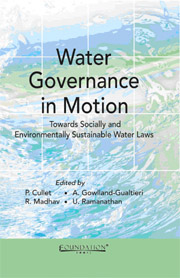Book contents
- Frontmatter
- Contents
- Acknowledgments
- Contributor Biographies
- Introduction
- I Water Law, Policy and Institutional Reforms in India
- II Ongoing Irrigation and Ground Water Reforms in India
- III Perspectives on Privatisation
- 8 Tirupur Water Supply and Sanitation Project: A Revolution in Water Resource Management?
- 9 The World Bank's Influence on Water Privatisation in Argentina: The Experience of the City of Buenos Aires
- 10 The Linkages between Access to Water and Water Scarcity with International Investment Law and The WTO Regime
- 11 More Drops for Hyderabad City, Less Crops for Farmers: Water Institutions and Reallocation in Andhra Pradesh
- IV Environment and Human Rights
- V Comparative Perspectives on Reforms
- Bibliography
10 - The Linkages between Access to Water and Water Scarcity with International Investment Law and The WTO Regime
from III - Perspectives on Privatisation
Published online by Cambridge University Press: 26 October 2011
- Frontmatter
- Contents
- Acknowledgments
- Contributor Biographies
- Introduction
- I Water Law, Policy and Institutional Reforms in India
- II Ongoing Irrigation and Ground Water Reforms in India
- III Perspectives on Privatisation
- 8 Tirupur Water Supply and Sanitation Project: A Revolution in Water Resource Management?
- 9 The World Bank's Influence on Water Privatisation in Argentina: The Experience of the City of Buenos Aires
- 10 The Linkages between Access to Water and Water Scarcity with International Investment Law and The WTO Regime
- 11 More Drops for Hyderabad City, Less Crops for Farmers: Water Institutions and Reallocation in Andhra Pradesh
- IV Environment and Human Rights
- V Comparative Perspectives on Reforms
- Bibliography
Summary
Introduction
Water cannot be replaced and is crucial for human and animal life on earth. These two simple statements clearly highlight the importance of water for the international community and its unique nature among other natural resources. The fact that more than a billion people lack adequate access to water should give a picture of the gravity of the problem we are facing. The problem has two main dimensions – the individual access to water services and the overall availability of water as a physical resource.
Against this background the paper seeks to address both these dimensions, by first considering whether foreign direct investments and international trade can be seen as instruments for coping with inadequate access to water for the individuals (2.1) and water scarcity (2.2) respectively. Then the paper explores the impact of both the international investment system (3) and the World Trade Organisation (WTO) regime (4) on States' capacity to deal with these problems. The main aim is to evaluate whether these two international regimes are capable of reconciling the conflicting needs in relation to access to water services and water scarcity.
Coping with Access to Water and Water Scarcity through Foreign Investments and International Trade
Ensuring universal access to water services and the fight against water scarcity are daunting challenges for several States. Financial constraints, infrastructural inadequacies and adverse natural events affecting the availability of the resource are just some of the factors that may hamper the pursuit of such objectives.
- Type
- Chapter
- Information
- Water Governance in MotionTowards Socially and Environmentally Sustainable Water Laws, pp. 269 - 298Publisher: Foundation BooksPrint publication year: 2010



